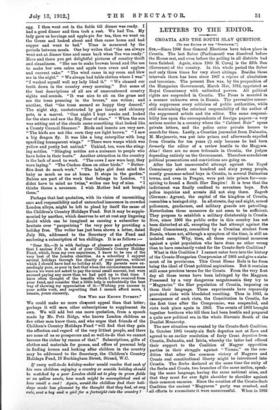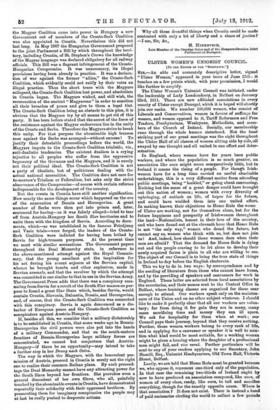LETTERS TO THE EDITOR.
CROATIA AND THE SOUTH SLAV QUESTION. (To THE EDITOR Of THE "SPECTATOR."] Sun,—Since 1906 four General Elections have taken place in Croatia. The last Sabor (Parliament) was dissolved before the House met, and even before the polling in all districts had been finished. Again, since 1906 M. Cuvaj is the fifth Ban (Governor) of the country. In this whole period the Sabor met only three times for very short sittings. Besides these intervals there has been since 1907 a regime of absolutism and terrorism. The present Ban was, by the proposition of the Hungarian Government, March 31st, 1912, appointed as Royal Commissary with unlimited powers. All political rights are suspended in Croatia. The Press is muzzled in a manner unknown even in Russia. The preventive censor- ship suppresses every criticism of public authorities, while still maintaining the criminal responsibility of the author of the suppressed article and the editor. The same responsi- bility lies upon the correspondents of foreign papers—a very serious matter in a country where the " Cabinet Noir " opens private letters, and the police enter private houses to search for them. Lastly, a Croatian journalist from Dalmatia, M. Marjanovic, was put into prison and afterwards expelled from Croatia for ten years (!) only because he had been formerly the editor of a review hostile to the Magyars. Alas ! there are no more tribunals in Croatia, the judges depending entirely on the Government. Therefore scandalous political prosecutions and convictions are going on.
After the last unsuccessful attempt against the Royal Commissary about one hundred and sixty young people, mostly grammar-school boys in Croatia, in several Dalmatian towns, and even in Prague, were put into prison for—con- spiring to found a South Slav Empire! It is true that the indictment was finally confined to seventeen boys. But police inquiries and arrests did not stop there. Zagreb (German: Agram), the capital of the kingdom of Croatia, resembles a besieged city. In all streets, day and night, armed policemen, gendarmes, and military guards are patrolling. Nevertheless these measures do not seem to be sufficient. They propose to establish a military dictatorship in Croatia Now, since 1906 the public order in this country has not been disturbed at all, excepting the last attempt against the Royal Commissary, committed by a Croatian student from Bosnia, whose act, although a symptom of the time, is still an isolated case. Why, then, all these exceptional measures against a quiet population who have done no other wrong than to have constantly voted for the Croato-Serb Coalition?
What is this Coalition P I cannot enter here into the history of the Croato-Hungarian Compromise of 1868 and give a state- ment of its provisions. This Croat Home Rule is far from being the ideal of Croat political aspirations. But it contains still some precious terms for the Croats. From the very first day all those terms have been infringed by the Magyars. Possessed by a very dangerous megalomania they try to " Magyarize" the Slav population of Croatia, imposing on them their language. These experiments have repeatedly provoked riots with bloodshed resulting. Thus in 1883, in consequence of such riots, the Constitution in Croatia, for the first time after the Compromise, was suspended, and riots took place again in 1903. The events of 1903 brought together brethren who till then had been hostile and prepared a quite new political era in the whole Slavonic South of the Dualist Monarchy.
The new situation was created by the Croato-Serb Coalition. In October 1905 twenty-six Serb deputies met at Zara and agreed to an earlier resolution of forty Croat deputies from Croatia, Dalmatia, and Istria, whereby the latter had offered their support to the Coalition of Magyar opposition
parties in their struggle against " Vienna," on the con- dition that after the common victory of Magyars and Croats real constitutional liberty might be introduced into Croatia. The Serbs declared at the same time the unity of the Serbs and Croats, two branches of the same nation, speak- ing the same laugua.ge, having the same national aims, and that they must for ever fight shoulder to shoulder against their common enemies. Since the creation of the Croato-Serb Coalition the ancient "Magyaron " party was crushed, and all efforts to resuscitate it were unsuccessful. When in 1906
the Magyar Coalition came into power in Hungary a new Government out of members of the Croato-Serb Coalition was also appointed in Croatia. Nevertheless this did not last long. In May 1907 the Hungarian Government proposed to the joint Parliament a Bill by which throughout the terri- tory, including Croatia, of St. Stephen's Crown the knowledge of the Magyar language was declared obligatory for all railway officials. This Bill was a flagrant infringement of the Croato- Hungarian Compromise. It was unnecessary, its illegal provisions having been already in practice. It was a declara- tion of war against the former " allies," the Croato-Serb Coalition, which evidently could not ratify by their votes an illegal practice. Thus the short truce with the Magyars collapsed, the Croato-Serb Coalition lost power, and absolutism in Croatia began. The Magyars wished, and still wish, the resurrection of the ancient " Magyarons " in order to sanction all their breaches of peace and give to them a legal tint.
The Croato-Serb Coalition being an obstacle to this plan, it is obvious that the Magyars try by all means to get rid of this party. It has been before stated that the secret of the force of the resistance against the Magyar endeavours lies in the unity of the Croats and Serbs. Therefore the Magyars strive to break this unity. For that purpose the abominable high treason case against the Serbs was arranged—without success ! To justify their detestable proceedings before the world, the Magyars impute to the Croato-Serb Coalition trialistic, viz., anti-dualistic tendencies. The existent dualism is a crying injustice to all peoples who suffer from the oppressive hegemony of the Germans and the Magyars, and it is surely not their political ideal. The Croato-Serb Coalition is not a party of idealists, but of politicians dealing with the actual national necessities. The Coalition does not care for to-morrow's Trialism or Federalism, but asks only the strict observance of the Compromise—of course with certain reforms indispensable for the development of the country.
But the events in Croatia have still another signification. Now nearly the same things occur which happened on the eve of the annexation of Bosnia and Herzegovina. A great number of Serbs were then put into prison and, later, sentenced for having—as it was falsely alleged—tried to tear off from Austria-Hungary her South Slav territories and to unite them with the kingdom of Servia. According to docu- ments, which—as was established in the famous Friedjung and Vasic trials—were forged, the leaders of the Croato- Serb Coalition were indicted for having been bribed by Servia for high-treason purposes. At the present time we meet with similar accusations. The Government papers throughout the Dual Monarchy state, in reference to the above-mentioned attempt against the Royal Commis- sary, that the young assailant got the inspiration for his act during his recent sojourn at the Servian capital, whence he brought bombs and other explosives, made in Servian arsenals, and that the revolver by which the attempt was committed is one similar to that in use in the Servian Army. The Government Press adds that there was a conspiracy ema- nating from Servia for a revolt of the South Slav masses on pur- pose to found a great Slav State which, besides Servia, would contain Croatia, Slavonia, Dalmatia, Bosnia, and Herzegovina, and, of course, that the Croato-Serb Coalition was connected with this conspiracy. Servia, is again denounced as a dis- turber of European peace and the Croato-Serb Coalition as conspirators against Austria-Hungary.
If, besides all this, we consider that a military dictatorship is to be established in Croatia, that some weeks ago in Bosnia- Herzegovina the civil powers were also put into the hands of a military Commander, and that on the south-eastern frontiers of Bosnia-Herzegovina large military forces are
concentrated, we cannot but conjecture that Austria- Hungary—if there be an opportunity—may intend to take a further step in her Drang nach Osten.
The way in which the Magyars, with the benevolent per- mission of Austria, proceed in Croatia is surely not the right one to realize their common Balkan plans. By such proceed- ings the Dual Monarchy cannot have any attracting power for the South Slays beyond her frontiers. She provokes even a general discontent of her own Slays, who all, painfully touched by the abominable events in Croatia, have demonstrated repeatedly their solidarity with their oppressed brethren. By prosecuting them for imaginary conspiracies the people may at last be really pushed to desperate actions. Why all these dreadful things when Croatia could be made contented with only a bit of liberty and a share of justice ? —I am, Sir, &c., H. HINKOVICII,
Late Member of the Croatian Saber and of the Ilungaro-Croatian Joint Parliament at Budapest.







































 Previous page
Previous page